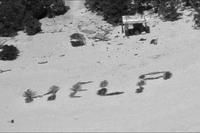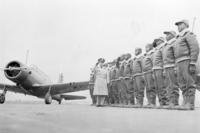The U.S. military had no involvement in the planning or execution of Israeli airstrikes that led to the mistaken shootdown of a Russian surveillance aircraft by Syrian regime anti-air batteries, resulting in the deaths of all 15 aboard, a U.S. coalition spokesman said Tuesday.
U.S. intelligence and the military also had no oversight of the Israeli attacks or forewarning from the Israel Defense Forces (IDF) of the intention to hit targets in northwestern Syria, said U.S. Army Col. Sean Ryan, a spokesman for Operation Inherent Resolve in Iraq and Syria.
"At the coalition level, we had no warning," he said in a video conference to the Pentagon from Baghdad. "[The Israelis] operate independently; they don't operate within our coalition system."
Russia initially blamed Israeli actions for the shootdown by a Syrian missile of the Ilyushin four-prop IL-20 aircraft, which was flying about 22 miles off the Syrian coast. The plane had been on a mission in support of President Bashar al-Assad's regime.
The incident occurred at about 11 p.m. Monday local time as the Il-20 reportedly was returning to Hmeimim, the main Russian air base in Syria, near Latakia.
Russia's Tass news agency said the Il-20 "disappeared during an attack by four Israeli F-16 jets on Syrian facilities in Latakia province."
A Russian Defense Ministry spokesman said Israel had given a warning, but it came less than a minute before the airstrikes -- not enough time for the IL-20 to take evasive action.
The spokesman accused Israeli pilots of "using the Russian airplane as a cover," and putting it "in the line of fire coming from Syrian air defense systems."
However, Russian President Vladimir Putin later appeared to soften Moscow's stance on Israeli culpability.
The IL-20 was shot down due to "a chain of tragic accidental circumstances," he told reporters in Moscow. "An Israeli jet did not shoot down our plane."
In Tel Aviv, Brig. Gen. Ronen Manelis, an IDF spokesman, said, "Israel expresses its regret over the death of the crew members of the Russian plane that was downed tonight due to Syrian anti-aircraft fire," according to a Jerusalem Post report.
"Israel holds the Assad regime, whose military shot down the Russian plane, fully responsible for this incident. Israel also holds Iran and the Hezbollah terror organization accountable for this unfortunate incident," Manelis said.
He said the IDF had struck a Syrian military facility housing weapons that were to be transferred to the Iranian-backed Hezbollah militia, which has been fighting alongside Syrian regime forces.
"Syrian anti-aircraft batteries fired indiscriminately and, from what we understand, did not bother to ensure that no Russian planes were in the air," Manelis said, according to the Post report. "The extensive and inaccurate Syrian anti-aircraft missile fire caused the Russian plane to be hit."
Israeli Prime Minister Benjamin Netanyahu later called Putin to express sorrow over the downing of the aircraft and the loss of life, Netanyahu's office said in a statement.
"The prime minister, in the name of the state of Israel, conveyed sorrow over the deaths of the Russian soldiers and said that the responsibility for downing the plane falls on Syria," Netanyahu's office said.
Israel's extensive remarks on the incident are a break with its usual practice of not commenting on strikes against Hezbollah in Syria and Lebanon.
In May, Netanyahu met with Putin in Moscow to seek the Russian president's help in getting Iran to stop backing Assad and supplying Hezbollah with weapons.
-- Richard Sisk can be reached at Richard.Sisk@Military.com.
















